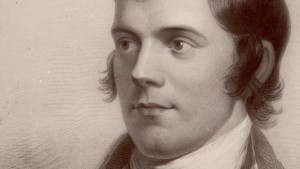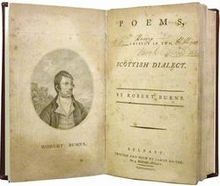
Robert Burns is well-known to Whisky lovers
For the Scots, Robert Burns is a national treasure and their greatest poet. Sadly, much of the world is vaguely familiar with his name at best, while most know one of his works, Auld Lang Syne (clue, think New Year’s Eve). Much of his work was composed in the Scots Lowland dialect (a dialect of Gaelic), and even his more “international” works were written in English, including many typical Scots words. In a time when many struggle to digest the words of Shakespeare, Burns’ poems can be treacherous albeit more sensible after a Whisky or three.
Burns’ life began in an ordinary fashion, being born the son of a poor tenant farmer on January 25, 1759. While resources were scarce, young “Rabbie” showed academic promise, and his father did all that he could to provide an education. Burns started composing poetry in 1783, mostly in his native Ayrshire dialect. For years, his poems would be heard and read by a few. In 1786, Burns made an arrangement with a printer in Kilmarnock to publish a collection of poems for the purpose of earning passage to Jamaica, where he was to become a plantation overseer/bookkeeper. The edition did so well that he abandoned the plan, moved to Edinburgh, and published a second edition the next year. He continued to write and publish his poems and songs until the time of his death in 1796, never seeing the 40th anniversary of his birth.

The Poems of Robert Burns
Burns’ influence continued after his death as it does today. The date of his birth is a National Day, and on and around each January 25, Scots and other Burns devotees gather for a Burns Supper to honor the poet. In true Scottish form, the Burns Supper consists of a meal centered on the ubiquitous Haggis, likely accompanied by neeps and tatties (mashed turnips and potatoes). Of course, Whisky is enjoyed, and it is customary for one or all to read a few selected Burns poems. The evening is opened with the Selkirk Grace:
Some hae meat and canna eat,
And some wad eat that want it;
But we hae meat, and we can eat,
Sae let the Lord be thankit.
When the main course is to be served, it is customary for the host to recite Address To a Haggis, a Burns poem penned in 1786.
Many toasts, the reading of Burns’ poetry, and perhaps dancing can punctuate the evening. An evening of Whisky exploration and good conversation among friends is also a proper homage.
If you are adventurous and ready for a tasty treat, you may want to include a haggis in the night’s celebration. Curious? Click here to see our take on a modern haggis.
Host your own Burns Night – Here is What You Will Need
